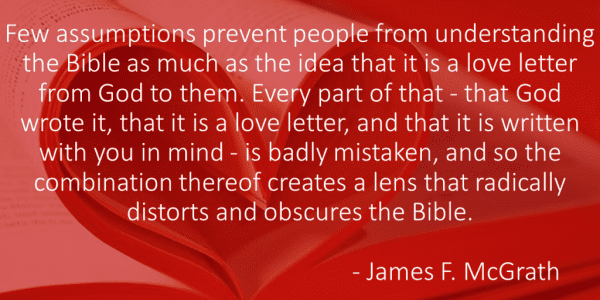Last week, James McGrath, over at Exploring Our Matrix, posted this meme :
I enjoy McGrath’s blog and have learned a lot from him. And I’ve been glad to get to know him a bit, digitally anyway, as a colleague on Patheos’ Progressive Channel.
But I think he overstates his case on this one. I’ve previously suggested the “Bible as love letter” analogy as one of the options with something positive to contribute to how Christians relate to the Bible.
Yes, the “Bible as love letter” analogy can and has been misused to distort what we should reasonably and reliably expect the Bible to do for us.
It can imply or underline a dictation theory of inspiration, in which God is presumed to be speaking words for the authors to write (to God’s “lovers,” all future readers).
It can blur the boundaries between the historical contexts of the Bible’s origins and our own contexts as contemporary readers.
It can render historical, textual, canonical (etc.) criticism obsolete. Who needs critical study of the Bible when we can just read it simply as a love letter from God? Who needs academic study when we can simply worship, pray…love?
These responses–call them temptations or tendencies–are all problematic from the standpoint of responsible approaches to an ancient document from contemporary readers.
The basic fact of the matter is that most of the Bible’s material simply doesn’t come close to fitting the “love letter” analogy. Legal material, genealogies and other historical records, accounts of violence and war, creation myths, even moral prescriptions seem to make the analogy a case of special pleading.
All that said, there are good reasons to argue for a limited use of the analogy.
Kierkegaard gave us a good example, in my opinion, of such a limited use. Here’s what he says in For Self-Examination:
Imagine a lover who has received a letter from his beloved–I assume that God’s Word is just as precious to you as this letter is to the lover. I assume that you read and think you ought to read God’s Word in the same way that the lover reads this letter. Yet you perhaps say, “Yes, but Holy Scripture is written in a foreign language”… (p. 26)
Now think of God’s Word. When you read God’s Word in a scholarly way–we do not disparage scholarship, no, far from it, but do bear this in mind: when you are reading God’s Word in a scholarly way, with a dictionary, etc., then you are not reading God’s Word–remember what the lover said: “This is not reading the letter from the beloved.” If you happen to be a scholar, then please see to it that in all this learned reading (which is not reading God’s Word) you do not forget to read God’s Word. (pp. 29).
Here’s the relevant section in Emerging Prophet where I describe his use of the analogy as a way of moving beyond the two “rationalisms” of academic higher criticism (then in it’s infancy period) and doctrinaire fundamentalism:
“Scientific scholarship,” was, for Kierkegaard, mainly an excuse to avoid the strenuousness of the New Testament. [1] In a journal entry, Kierkegaard suggests that the New Testament should be read without a commentary. Using the analogy of a love letter, he wonders why anyone would read a love letter using a commentary.[2] The “love letter” metaphor sheds light on Kierkegaard’s distaste for scholarly apparatus and third-party mediation. The Bible is written from God to the single individual, and should be read with that in mind: “Every commentary detracts. He who can sit with ten open commentaries and read the Holy Scriptures—well, he probably is writing the eleventh, but he deals with the Scriptures contra naturam.” [against its nature] [3]
It is important to note that Kierkegaard likely did not object to the use of critical interpretive methodologies as a basic hermeneutical tool, when used for the purpose of greater biblical understanding. But he objected to the elevation of human reason as the ultimate, final arbiter of what the Bible means.[4] Most crucially, he objected to using higher criticism as an avoidance, or distraction, tactic from its ethical and religious function. The key, he insisted, was the disposition of the interpreter and the goal of interpretation.[5] Kierkegaard did not object to the application of reason (and imagination) in the interpretation of Scripture, nor did he object to individuals interpreting Scripture and doing theology; he was a Lutheran, after all.[6] His concern was to secure the priority of divine revelation over human rationality and to maintain a place for the Holy Spirit in guiding one’s interpretation of Scripture.[7] Kierkegaard would rather see Denmark give all its Bibles back to God[8] than perpetuate a situation in which the Bible is approached as an historical curiosity, an aesthetic masterpiece, or even a doctrinal compendium, rather than for what it really is: the “highway signs” pointing to Christ, the way of truth and life.[9]
Now, this description and contextualizing may not make the analogy any more palatable to those who object to it as fundamentally misleading or to those who object to its potential and actual misuses.
But I do think there is something here worthy of reflection.
On a personal note, Kierkegaard’s approach to the Bible helped me move beyond the literalism, objectivism, and doctrinalism of evangelical fundamentalism (any number of other “isms” could be tossed in here) into a more dynamic, relational, and contextual view of the Bible. This reflects a pietistic (in the historical, church-history sense) approach to Scripture as meant primarily for spiritual transformation and as applicable in that spiritual sense to all readers (not just its first recipients).
I’m currently co-authoring a commentary, so it may seem strange for me to come to the defense of Kierkegaard’s analogy. Aren’t I one of those who are dodging God’s Word precisely by writing academic commentary about it?
But it seems to me the main gist of Kierkegaard’s point is that the way we relate to the Bible will evidence what we think of the Bible’s role in the context of our relation to God. The ultimate objective of our reading of the Bible shouldn’t be academic knowledge (information for information’s sake) or doctrinal understanding, but action, transformation, response. The Bible is important because it derives from God and makes ultimate sense in the context of our relation to God–not the other way around.
For all its limitations (and I admit there are certainly limitations), the analogy might be a good “first step” away from a view of the Bible as merely a historical document or as merely as doctrinal or moral handbook into a view of the Bible as instrumental for experiencing the holy and witnessing to the gospel.
For more links and discussions on theology and society, like/follow Unsystematic Theology on Facebook
[1] On this point, see Murray Rae, Kierkegaard and Theology, 45-46
[2] JP 1, 210. He acknowledges, that, were the letter written in a foreign language, one would learn the language in order to understand the letter, but otherwise use of a commentary should be out of the question.
[3]JP 1, 210.
[4]JP 1, 210.
[5]One of the influences on Kierkegaard’s theological education was the biblical scholar H.N. Clausen. Clausen was a student of Schleiermacher and a devotee of the “rational” and philological approach to synthesizing the Bible’s meaning. See Elrod, Kierkegaard and Christendom, 31.
[6]Kierkegaard’s view of the Bible and of the freedom of individuals to interpret the Bible contrasted with his contemporary, N.F.S. Grundtvig, who argued that the best response to the rising critical, rationalist approach (and to the problem of interpretation) was to set the Bible aside in favor of the creeds and church practices. For a comparison of Grundtvig and Kierkegaard on the role of the Bible in the Christian life and church, see Roberts, “The Living Word or the Word of God? Kierkegaard and Grundtvig as Two Kinds of Pietists,” in The Pietist Impulse in Christianity, ed. Christian Collins Winn, et. al. 120-134.
[7]The role of the Spirit in biblical interpretation and theology will be unpacked in Chapter 3.
[8]JP 1, 216.
[9] JP 1, 208.

















